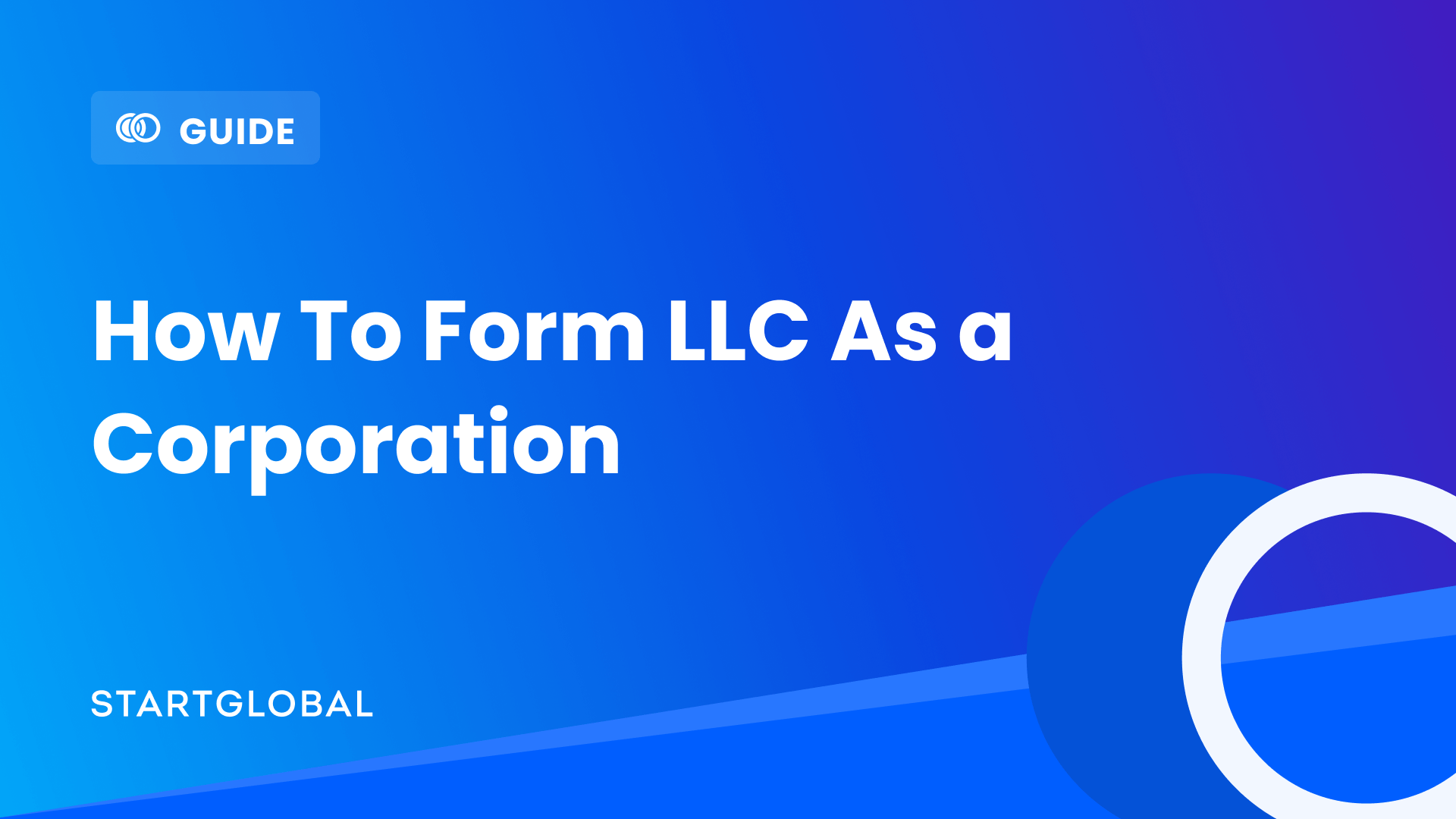LLC as Corporation
An LLC that is elected to be treated as a corporation combines the best of 2 business entities — LLC and Corporation.
It is an awesome step-up for existing LLCs.
In this guide, you will find out what LLC as a corporation is and how it can unlock some amazing benefits for you, as an LLC owner.
Definition
What exactly is an LLC?
Let’s start with understanding what an LLC is.
An LLC aka Limited Liability Company (LLC) is a business entity, created by state statute that gives liability protection to business owners.
It offers more protection than sole proprietorship and partnership. But it is much easier to maintain than a corporation.
By default, an LLC with a single member is treated by the IRS as a sole proprietorship and LLC with 2 or more members as a partnership.
So, if an LLC wants to be treated as a corporation, you could file a form with the IRS and request them to change your classification. Once approved, the LLC will remain as the same legal entity but will be treated as a corporation for federal tax purposes.
Now, why would anyone want an LLC to be treated as a corporation?
Glad you asked.
Turns out, there are quite a lot of benefits.
Tax Election
Why elect the LLC to be treated as a corporation?
Lower overall tax
In a regular LLC, business income is passed through to the owners and they pay taxes at individual tax rates.
When elected as a corporation, LLC pays tax on its business income at corporate tax rate. And instead of passing through income, they pay salaries to the members. These corporate tax rates are usually lower than personal tax rates.
All regular C-corporations are taxed at 21% on their profits. On the other hand the top 3 personal income tax rates are between 32% — 37%. Ouch!
Better expense deduction
In a regular LLC, there is a limit on the amount that can be deducted for expenses such as, life insurance, medical insurance, child care, education and retirement plans.
LLC treated as a corporation has no such limitations when it comes to deductions for their member-employees.
Easier tax formalitie
In LLC as a corporation, members can be hired as employees. And the LLC takes care of handling all sorts of employment-related taxes.
Also, the LLC issues W-2 Forms to the member-employees much earlier in the year than an LLC as a partnership would issue Schedule K-1 (Form 1065) to members.
Better for retained earnings
If your LLC plans to retain a large portion of its earnings within the LLC itself, you can take advantage of corporate taxation when elected as a corporation.
Because, in a pass-through LLC, whether or not your LLC has retained earnings, members will have to pay income tax on the entire business income. Keep in mind: personal tax rate— 32-37%, corporate tax — 21%.
How to Elect
How to elect to be treated as a corporation?
- Fill up Form 8832 (Entity Classification Election)
- Fill up the consent form and have it signed by all the members of the LLC (or one member on behalf of others)
- Provide the names and identifications of all members: ID can be SSN or EIN of each owner
- Send this form via mail or fax to IRS
- Attach a copy of Form 8832 to the entity’s federal tax/information return. If your entity doesn’t have to file a tax/information return at the end of the year, a copy of Form 8832 has to be attached to the tax returns of all its owners
Note
IRS has a 60-month limitation rule i.e, if you have already elected to change the classification once in the past, you’ll have to wait for 60 months before changing it.
There are exceptions to this rule though.
Ownership of an LLC As a Corporation
Can anyone own an LLC as a corporation?
Even if your LLC has made the election to be treated as a corporation, it is still an LLC under the hood. Not a corporation.
The legal entity of the LLC won’t change when you change the tax classification.
Members of an LLC still remain owners of the LLC that’s elected as a corporation. There is no change there.
Taxes
What are my tax obligations?
Ok, let’s get to the interesting part: taxes
LLCs pay income taxes at the corporate level instead of passing on the income to LLC members.
Based on the earnings, the LLC pays income tax via Form 1120 (U.S. Corporation Income Tax Return). Corporate income tax rate is at 21% on the LLC’s profits.
This way members don’t have to pay LLC’s income tax. They only have to worry about their personal taxes.
Taxes to be paid by members
If members are paid dividends from company profits: There will be double taxation— first at the corporate level(21%), second at the members’ personal level(23.8%). To avoid this, members are usually hired by the LLC.
If members are hired as employees: There will be no double taxation. Their salaries are deducted as business expenses and are only taxed once at their personal level(32-37%).
Note
For LLCs that have not elected to be treated as a corporation, it is not possible to hire a member as an employee.
Tax reporting
There are more filing formalities here as compared to regular LLCs.
Some of them are:
Form 1120(U.S. Corporation Income Tax Return): This is the main tax return filed by the LLC.
Form 1099-DIV(Dividends and Distributions statement): If the LLC has issued dividends during the year, it has to send Form 1099 to every member. Members include this on Interest and Ordinary Dividends schedules (Schedule B) which is attached to their personal tax returns (Form 1040)
Form 1040, US Individual Tax Return*: When the member-employees of the LLC has received salary or dividends, they will individually have to file their personal tax returns.
Form W-2(Annual Wage and Tax Statements): If there are employees or when you have a member as an employee, LLC is required to send Form W-2 to each of them.
Employment taxes
Since an LLC that’s elected to be treated as a corporation will most certainly have their members as employees, it will have to pay employment taxes.
It is not just for member-employees. Employment taxes are to be paid for every employee in the LLC.
Payroll tax
Social Security tax, Medicare taxes and unemployment insurance are collectively referred to as ‘payroll taxes’.
Half of the amount for payroll taxes is collected from the employee’s paycheck. And the other half is contributed by the LLC. The employee’s share is withheld by the LLC when issuing paychecks.
FICA tax(Social Security & Medicare) – Employer portion is 6.2% for Social security and 1.45% for Medicare. LLC withholds the same amount from the employee’s paycheck as well
FUTA tax – It covers unemployment insurance. Of the total amount of 6%, states usually have a 5.4% credit. The other 0.6% is paid by the employer.

For non-residents
LLC members who don’t reside in the US don’t have to pay payroll taxes. If however, you have an employee residing in the US, you will have to pay payroll taxes for that employee.
How to pay all these taxes?
Income taxes and employment taxes are paid as estimated taxes to the IRS.
What’s this estimated tax?
Estimated tax is a method of splitting up your total annual tax amount and paying them as 4 quarterly instalments.
You’ll have to estimate your income ahead of time and pay them at the end of every quarter in April, June, September, and January.
If your LLC is estimated to pay more than $500 income tax annually, you will have to pay them as quarterly payments.
Can’t I just pay all taxes in one shot at the end of the year? Nope. IRS won’t buy it.

IRS charges a penalty if you fail to pay an installment or pay it late. So, keep this in mind if you’re just starting up or if you haven’t earned any income during a quarter, you can skip an installment entirely.
Pay Yourself
How do I pay myself from an LLC?
Let’s talk about how you can take money out of the LLC.
Salary
An LLC that is treated as a corporation can employ its members as full-time employees. This is a very common method of taking money out.
Salary is deducted as a business expense from the LLC. And it is only taxed at the owner’s level, thereby avoiding double taxation.
Dividends
LLC can pay out dividends to its shareholders( i.e, LLC members) on their business earnings.
This is taxed at the corporate level and also at the member’s level. That is double taxation. First, corporate tax at 21%, and then members pay individual income tax on their dividends at capital gains rates, which range up to 23.8%.
Most LLC owners try to avoid this and take full-time salaries from the LLC.
Hiring
Can I hire employees in an LLC?
Whether it is a manager to manage the entire operations or other employees, you can comfortably hire employees in an LLC.
It comes with a few responsibilities though:
- LLC has to withhold tax from the employee’s wages for social security, medicare and unemployment insurance, deposit it with the IRS, and state agencies.
- LLC has to file Form W-2 for each employee.
- Depending on the state you’re in, LLC has to notify state and local authorities about the new hires.

For non-residents
If a non-resident-owned LLC has an employee living the US, you would have to start paying payroll taxes. If you wish to avoid having to pay payroll taxes, you can hire independent contractors or freelancers. The law asks you to pay taxes if you have a ‘dependent agent’ in the US. How to establish ‘dependence’ is a slightly complicated area. It is best to speak with a lawyer regarding this.
FAQ
Frequently Asked Questions About An LLC
Here are the most commonly asked questions about forming an LLC business:
Well, it depends on what you want. LLC is treated as a corporation, allowing for lower income tax rates and other benefits. But it has slightly more paperwork than a regular LLC.
Well, it depends on what you want. LLC that is treated as a corporation allows for lower income tax rates and other benefits. But it has slightly more paperwork than a regular LLC.








 CHAT WITH US
CHAT WITH US